|

Autumn 2006 (14.3)
Pages
26-35
Hafiz Pashayev
Reminisces
Azerbaijan's
First Ambassador to the United States
1. Section
907 of the Freedom Support Act: What is it?
2. Ambassador
Hafiz Pashayev:
Other Articles Published in Azerbaijan International
  The
Soviet Union had just collapsed (late 1991). Everything was in
chaos. The enormous network between 15 republics that had been
operating for more than 70 years had been abruptly severed breaking
the links shared between spheres such as medicine, science, education,
social services, manufacturing and the arts. The
Soviet Union had just collapsed (late 1991). Everything was in
chaos. The enormous network between 15 republics that had been
operating for more than 70 years had been abruptly severed breaking
the links shared between spheres such as medicine, science, education,
social services, manufacturing and the arts.
Add to the confusion and economical turmoil of those days, the
disastrous war with Armenia over the territory inside Azerbaijan
known as Nagorno Karabakh which had left Azerbaijan overwhelmed
with hundreds of thousands of refugees desperately seeking adequate
shelter, food, water and safety, not to mention the drastic urgency
to attend to medical and psychological needs of those displaced
citizens who had been forced at gunpoint to abandon their communities,
their property, which meant leaving behind much of their identity,
their networks, and even their loved one's graves.
And though the United States had pledged to assist the former
Soviet republics with substantial financial aid until they could
find their way and get back on their feet, there was a small
clause - which became known as Section 907 of the Freedom Support
Act that prohibited any aid - even humanitarian in nature - to
be given directly to the Azerbaijani government.
Armenians had succeeded in getting Congressional representatives
to inject this restriction into the legislature despite the fact
that it was information based on lies and misrepresentations.The
circumstances were far from ideal in an attempt to begin building
cordial relationships with representatives of the one remaining
super power in the world - the U.S. That responsibility was thrust
on Hafiz Pashayev, Azerbaijan's first Ambassador to Washington.
Interestingly, we announced Pashayev's appointment in that first
issue of Azerbaijan International, which we published in January
1993. Now 14 years later, the Ambassador's assignment is over
and he has returned to Baku. He kindly agreed to sit down with
us again and share some of his insights and reflections about
his years in Washington. Azerbaijan International's publisher
Pirouz Khanlou interviewed the Ambassador in Baku on August 26,
2006.
______
  Azerbaijan International: In your new book - Racing Up Hill
- you describe those first years serving as Azerbaijan's first
Ambassador to the United States like being asked to climb Mt.
Everest with little knowledge of the idiosyncrasies of this giant
peak. You were referring, of course, to obstacles hindering the
Azerbaijani-U.S. relationship because of the passage of Section
907 of the U.S. "Freedom Support Act"1 which
denied all direct aid to the Azerbaijani government. Azerbaijan International: In your new book - Racing Up Hill
- you describe those first years serving as Azerbaijan's first
Ambassador to the United States like being asked to climb Mt.
Everest with little knowledge of the idiosyncrasies of this giant
peak. You were referring, of course, to obstacles hindering the
Azerbaijani-U.S. relationship because of the passage of Section
907 of the U.S. "Freedom Support Act"1 which
denied all direct aid to the Azerbaijani government.
Here we are - nearly a decade and a half later - and that piece
of U.S. Congressional legislation is still effectively on the
books. Of course, some might argue that it doesn't really matter
these days as Azerbaijan has found its own way without aid from
the U.S.
Others might point out that despite the law, Azerbaijan is currently
receiving assistance because each year since 2002, President
George W. Bush has personally signed a waiver allowing some aid
to be channeled to Azerbaijan's government, though most of the
funds are earmarked for projects related to security in support
of America's alleged "War on Terror". But given how
history has played out, from your perspective what difference
would it have made if there had not been that restrictive clause
back in 1992?
What difference would it have made if the U.S. had directed aid
to the Azerbaijani government as it did to each of the 14 other
former republic 2 of the collapsed Soviet Union?
Ambassador
Pashayev:
It would take an entire
day to exhaust this subject. For sure, Section 907 had many implications
for Azerbaijan and for those early bilateral relations between
our two countries. Many of the pages in "Racing Up Hill"
deal precisely with this issue.
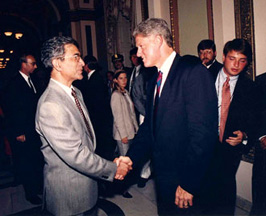  Left: Ambassador Pashayev congratulating U.S. President
Bill Clinton in the Capitol Building on the occasion of his State
of the Union Address, January 1999. Left: Ambassador Pashayev congratulating U.S. President
Bill Clinton in the Capitol Building on the occasion of his State
of the Union Address, January 1999.
But it wasn't only the refugee
situation that overwhelmed us. Everything was in chaos. The enormous
network between the 15 republics of the former Soviet Union,
which had been operating for nearly 70 years, had totally collapsed,
abruptly severing the infrastructure of the vastest nation in
the world which stretched across 12 time zones. All links in
the spheres of economic, medical, educational and social services
had been cut. We, along with the other republics, felt that we
had been abandoned and orphaned.
For the reason, the U.S. government's
decision to deprive us of assistance during the desperateness
of our fundamental needs, was a devastating blow to us morally.
One must view Section 907 in its historical and political context.
Throughout those long years of the Soviet occupation of our country,
we had looked to America as a beacon of hope, democracy and justice.
For us, America could be counted upon to be a strong defender
of human rights. We had aspired to those life-affirming qualities;
we dreamed of the day when government would look after our own
people in the same way.
First of all, it's true that we did feel the economic impact
of not receiving humanitarian assistance in those early days
of our independence. The tragic conflict with Armenia over our
territory in Nagorno Karabakh (NK) had left us with more than
700,000 refugees. We desperately needed to improvise basic shelter,
and provide food, water, and exposure from severe climactic conditions.
The mere survival of our people depended upon it. In addition,
there were enormous medical and psychological needs of our displaced
population who had been forced to flee their property, their
communities and, virtually, everything they knew.
So the first close political encounter with the U.S. that we
had as an independent fledgling country shocked us very deeply
in the core of our psyches. Finally, as we were trying to shake
off Soviet oppression - an effort which the United States themselves
had actively endorsed and encouraged - we discovered that they,
too, had shunned us, ignored our needs and abandoned us when
we needed help the most. Psychologically, it was a demoralizing
blow.
How could America deny aid to us in those needy days when they
were pouring billions - not just millions - but billions - of
dollars into the infrastructure of the other former republics
of the Soviet Union? And how could they deny aid to us - the
victim of aggression - when they were showering significant aid
on the Armenians who had brought all this devastation and death
upon us? To this day, our people do not understand this.
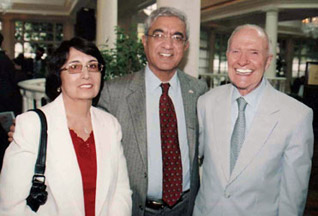  Left: Hafiz Pashayev and wife Rana with Brent Scocroft
at the Farewell Reception for Ambassador Pashayev, July 2006.
Air Force General Snowcroft served as National Security Advisor
under President George H. W. Bush (current Bush's father) Left: Hafiz Pashayev and wife Rana with Brent Scocroft
at the Farewell Reception for Ambassador Pashayev, July 2006.
Air Force General Snowcroft served as National Security Advisor
under President George H. W. Bush (current Bush's father)
From the very first day of its passage on April 1, 1992, it was
obvious to us that this decision could not be justified. Let
me be fair and add that many Americans also understood how unwarranted
and wrong this judgment was. Armenia accused Azerbaijan of a
so-called "blockade against Armenia". It was a very
skillful Armenian subterfuge that served them well, especially
among uninformed Americans.
Even the United Nations had identified and condemned Armenia
as the aggressor in this war over Nagorno-Karabakh. Between 1993
and 1994, the UN had passed four resolutions condemning Armenia's
aggression on our territory. And yet, via the Freedom Support
Act, the United States was blaming and punishing us for the war.
There were times when I would visit Congressional office that
it seemed like I had to prove to everybody that I wasn't some
sort of nomadic creature from the desert, far removed from civilization
- that I was, in fact, a human being. That was the situation
we dealt with in Azerbaijan back in 1992-1993.
I'll never forget some of the discussions we had with members
of Congress and their staff. Of course, the substance of those
meetings primarily related to the Armenia-Azerbaijan conflict
and Section 907. We would go back again and again to the same
office and hear the same diplomatic cordialities: "It's
nice to see you again, Mr. Ambassador." Or "We will
definitely try to address your concerns, Mr. Ambassador."
"Let me see what we can do to improve the humanitarian situation
in your country," and so on. In short, I got nowhere beyond
politeness.
That reminds me of another incident in the mid-1990s when Madaleine
Albright was Secretary of State under President Bill Clinton.
During a meeting with our Foreign Minister [Hasan Hasanov at
the time], she closed her remarks, attempting to compliment me
in front of my boss for the job I was doing in Washington. The
Minister looked at me and then turned back to her and commented:
"We'll make a judgment about his work in Washington after
Section 907 is repealed." Albright immediately responded:
"Poor Mr. Ambassador. He might have to stay in Washington
for the rest of his life." It seems she wasn't far off target.
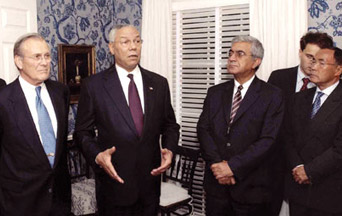  Left: Colin Powell (center), as U.S. Secretary of State
during the first administration of President George W. Bush at
a reception hosted by Secretary of Defense Donald H. Rumsfeld
(left) on September 10, 2004. Left: Colin Powell (center), as U.S. Secretary of State
during the first administration of President George W. Bush at
a reception hosted by Secretary of Defense Donald H. Rumsfeld
(left) on September 10, 2004.
You remember all those difficulties that Azerbaijan went through
1992, 1993 and 1994.3 Other
former Soviet republics were receiving significant assistance.
During those years, approximately 13 or 14 billion dollars of
U.S. assistance was granted to countries that had finally won
their freedom shaking off the yoke of the Soviet Union. And the
Azerbaijan government was deprived of any of it.
AI: What impact did Section 907 of the Freedom Support Act have
on the Nagorno Karabakh conflict?
Ambassador Pashayev: The greatest consequence of 907, however,
was the enormous negative impact it had upon the peace process
and the resolution of the conflict between Armenia and my country
over Nagorno-Karabakh. Whether this is what the U.S. intended
or not, the legislation which denied us aid emboldened Armenians
and gave them an edge over us - an advantage in the conflict.
Section 907 was interpreted both by Armenians and Azerbaijanis
as indirect support for Armenia, especially in relationship to
the resolution of this war.
Clearly, Section 907 has had an enormous negative impact on the
region by slowing down the peace process. The Armenian Diaspora
and their lobbyists are still able to seize the advantage and
insist on a hard-line position rather than negotiating a peaceful
resolution. It emboldens Armenians to insist on independence
for Nagorno Karabakh or in joining the land that they captured
during the war to Armenia. But this is our territory.
Most people in the international community recognize that Armenia
is the aggressor and Azerbaijan is the victim. We are the ones
who had an enormous burden of refugees and lost about 15 percent
of our territory. Many Azerbaijanis do not view the U.S. as an
honest broker in the peace process. The American government is
not perceived as an impartial negotiator.
AI: What difference would it have made to the average Azerbaijani
if there had been no embargoes in those very critical days when
Azerbaijan was dealing with a war with Armenia and the displacement
of hundreds of thousands of refugees on its small, impoverished
territory?
Ambassador Pashayev: Even to this day, Azerbaijanis do not
accept that Section 907 is still in place. When I take taxis
in Baku, drivers often comment: "We're best friends with
the U.S. We're doing our best to strengthen our relationships
with them. We've made our energy resources available to them.
We're actively engaged in their 'War against Terror'4. We've even
sent our men to assist in Iraq. Ordinary people in Azerbaijan
simply cannot understand why the U.S. has placed these sanctions
against us. They are always asking, "Why, why, why?!"
A big part of my job has been to try to explain why it happened.
It's not because the U.S. isn't friendly towards us. It's the
reality of their political system, which allows lobbyists, even
minority ethnic groups, essentially to buy Congressional votes.
There's no valid reason why sanctions were imposed on Azerbaijan.
To tell you the truth, it's becoming more and more evident that
the political system in the United States needs a major overhaul
because of the overwhelming influence that small ethnic groups
or other lobbyists can have on Congress, influencing them with
monetary support, which, in turn, determines the outcome of elections.
I'm convinced that such factors are undermining U.S. foreign
policy, not only in relationship to Azerbaijan, but towards every
major issue in general. And this is extremely detrimental to
the institutions of democracy. It damages the democratic process.
The profound negative influence of lobbies on the U.S. government
has become a major topic of discussion in many political circles.
The two primary reasons why Armenians still expect to achieve
full independence of Nagorno Karabakh is that during the first
years of our independence, Armenia received support from Russia
as well as from the U.S.
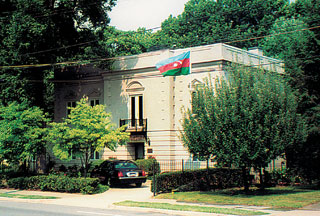 |
Left:
The building
of Azerbaijan's Embassy in Washington D.C., was selected during
Pashayev's tenure.
AI: Did anything good come
from not receiving U.S. aid? Was it all negative?
Ambassador Pashayev:
You're right. Some good did come out of it. In fact, one should
not underestimate the benefits that resulted from having those
sanctions placed against us. First of all, we learned not to
depend on anyone except ourselves and not rely on major powers
to bail us out of our own complicated situations. Secondly, it
obliged us at the Embassy to become fast learners of the U.S.
political system. Section 907 became a major case study for Azeri
diplomats. Actually, those experiences served as an apprenticeship
for many of the outstanding young diplomats who now have taken
on very prominent positions in international relationships. For
example, Elmar Mammadyarov who worked with me in Washington is
now Azerbaijan's Minister of Foreign Affairs. Fakhraddin Gurbanov
is Ambassador to Canada, Elin Suleymanov has just opened the
Consulate in Los Angeles. Taghi Taghizade is the Press Secretary
for the Ministry now. |
Our embassy became a training ground for understanding the intricacies
of Washington. Colleagues in other embassies often sought our
advice when dealing with Congress.
AI: You've been conscious
of many dozens of meetings where top leaders have discussed and
attempted to negotiate a resolution of the war with Armenia,
how do you think the Nagorno-Karabakh problem can be resolved?
Ambassador Pashayev:The Caucasus states have a choice to
make because the outcome to this war is not historically inevitable.
We and our neighbors can continue to dwell on the animosities,
hatred and conflicts of the past; in which case, we will continue
the cycle of violence, death and poverty. Clearly, if we do not
solve these problems ourselves, others will attempt to solve
them for us at the expense of our own independence.
There's one historical principle in which I believe: those who
remain preoccupied with the past will lose their hope for the
future. Those who look backward can never see the future. Preoccupation
with the past and the issues of territorial expansion have led
to devastating results for the entire region.
AI: But the recalcitrance of Armenians in this conflict has
had its own repercussions. It has backfired. For example, the
most direct route for Baku's oil pipeline to the Turkish Mediterranean
was not through Georgia, but through Armenia. But when Armenia
was not willing to resolve the Nagorno-Karabakh problem, Azerbaijan
refused to allow the pipeline to go through their territory.
The pipeline detoured Armenia resulting in Georgia becoming the
beneficiary. As a consequence, the pipeline is really longer
than it needed to be and Armenia as a poverty-stricken, land-locked
nation, missed an enormous opportunity. Armenia would have made
millions of dollars in transit fees alone for the rights for
oil to pass through their country on its way to market.
Ambassador Pashayev: Armenians are missing many opportunities
available in the region. That's true. But it's the fault of their
Diaspora that continues to lobby the U.S. Congress and hold to
such a strict, hard-line position. Let me also mention that one
should not overlook how private business exploits the situation.
Every year, Armenians hold telethons to raise money on television
and they succeed in raising millions of dollars. It's a known
fact that many of those funds never reach Armenia. One must never
forget how the war can be exploited as a business opportunity.
In the long run, these selfish private interests complicate the
process of solving this conflict.
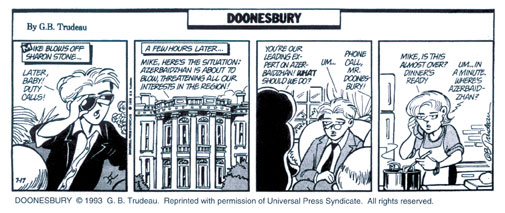
 Left: Doonesbury comic strip by Garry Trudeau in early
1993, reflecting how little was known about Azerbaijan - even
in governmental circles. Left: Doonesbury comic strip by Garry Trudeau in early
1993, reflecting how little was known about Azerbaijan - even
in governmental circles.
AI: As Ambassador those first
years in Washington, what were some of the perceptions people
had about Azerbaijan. After all, as a newly independent country,
Azerbaijan had been relatively obscure and unknown for 70 years.
I remember how often we used to meet people who hadn't a clue
even how to pronounce the name "Azerbaijan" correctly.
Ambassador Pashayev: Americans
had such little knowledge about Azerbaijan during those early
days. Most people didn't know anything at all about our country.
Often people would call us seeking visas to visit Abidjan [Ivory
Coast] or Abuja [Nigeria]. People would ask: "Are there
any McDonalds in your African nation?"
Or there was a cartoon published in 1993 by political satirist
Garry Trudeau. In the four-cell scenario, he sketches the boss
in the White House calling on the so-called "leading expert"
of Azerbaijan to get his advice. "Azerbaijan is about to
blow", he is told. At the same moment the "expert"
receives a phone call from his wife, wondering when he will be
arriving home for dinner. Totally befuddled, he uses the opportunity
to ask her: "Do you know where Azerbaijan is?"
Americans are quick to admit that they don't know geography very
well. I remember during my first visit to California in 1975
where I spent 10 months in graduate studies in physics, I was
once stopped by a policeman. He looked at my driver's license,
which had the name and emblem of the Union of Soviet Socialist
Republics (USSR) and asked: "Where's that?"
I deliberately didn't mention Russian and named some other places
such as Ukraine, Azerbaijan, Moscow, Kyiv, Leningrad, Baku. Only
after I mentioned the word "Russia" did he look at
me and say: "Yes, I know where Russia is, but you don't
look Russian to me." This lack of awareness about our part
of the world meant that a great part of my mission in Washington
was simply to educate Americans about Azerbaijan, beginning with
very basic information.
I'll never forget another incident when a member of Congress
was surprised to learn that Armenia was not surrounded on all
sides by Azerbaijan. "I would never have voted for the U.S.
sanctions against Azerbaijan if I had realized that at the time,"
he confided.
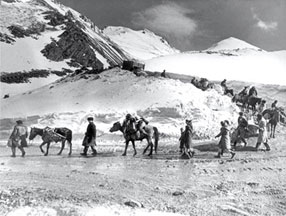 |
Left: The realities of Nagorno-Karabakh war
with Armenia. Fleeing Kalbajar in the mountains of the Caucasus.
Photo: April 1993.
AI: What is the difference
between the way that Azerbaijanis perceive the United States
today as compared with 10 years ago?
Ambassador Pashayev: In the 1990s, when relations between
Baku and Washington were gradually strengthening, I also observed
the transformation of both American and Azerbaijani societies.
While Monica Lewinsky5 was becoming
a household name in America, the people of Azerbaijan were awakening
to the world around them, including life in America. We were
both puzzled and amused by the whole Clinton affair. But in the
end it offered, not just a window into the complex life of politics
in America, it also pointed to the strength of the American political
system. It meant that one could, indeed, question authority without
resorting to violence and mayhem. The lesson learned was that
the President of the most powerful country on earth could be
held accountable. Not surprisingly, good governance, democracy
and human rights started to creep into the lexicon of Azerbaijan's
political culture.
|
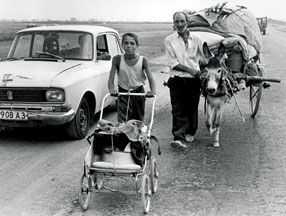 |
Left:
Azerbaijanis used whatever mode
of transportation was available to flee from the attacking Armenians
- helicopters, trucks, tractors, cars, horses and donkeys. Many
of them had to walk on foot dozens of kilometers before reaching
safety. Photo: 1993.
Despite this, it's difficult
for me to explain to our public that the U.S. genuinely wants
democracy to develop in Azerbaijan. Many people here view democracy
as another guise that the U.S. uses to impose its own influence
or presence here in Azerbaijan. People sometimes ask me if the
U.S. genuinely advocates for human rights. They say that if it
were really true, at least, the U.S should talk about, think
about and help our refugees and that they should be an honest
broker when it comes to Armenian aggression towards Azerbaijan.
These are the issues that people are raising here. When some
members of Congress come here preaching about human rights, Azeris
immediately point out that the U.S. themselves hindered human
rights when it came to our refugees.
Of course, the U.S. has one
of the most-developed democracies in the world. Its political
system is quite accessible for everybody. In fact, sometimes
it's so open that some groups take advantage of the system and
impose their own agendas at the expense of the greater American
interests.
|
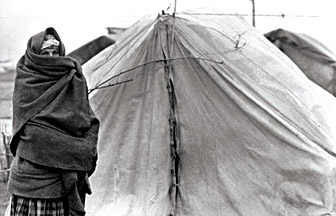 |
 |
Left: Canvas tents were provided
for the hundreds of thousands of refugees who fled Armenian occupation.
However, since the tents were set up out on the open plains in
central Azerbaijan, they provided little shelter against exposure
to harsh climactic conditions - both the frigid cold of winters
and scorching heat of summers. The United Nations estimated that
approximately 700,000 Azerbaijanis were forced to leave their
villages and towns because of the war over Nagorno-Karabakh.
Photo by Oleg Litvin.
Right: Since fuel was extremely scarce and
survival depended upon it, refugees started cutting down trees
to prepare their food. Photo: Betty Blair, 1993.
The beauty of the system
is that all Americans have had an opportunity to express themselves.
And, of course, in my view, it has the most advanced system in
terms of serving people.
President Ilham Aliyev was officially invited to Washington in
April 2006 to meet with President George W. Bush at the White
House. That meeting highlighted the geopolitical importance of
Azerbaijan and gave a new and strong impetus to relations between
Baku and Washington. A broad spectrum of issues was discussed
during that meeting, including energy development, regional security
and non-proliferation of WMD (Weapons of Mass Destruction).
Despite the fact that November 2005 Parliamentary Elections had
many novelties that were implemented for the first time such
as the allocation of free airtime on state television to all
candidates, the marking of fingers of those who had voted with
invisible ink, the conducting of exit polls, opposition parties
and some members of the Western media were preparing themselves
for an Azerbaijani "color revolution".6
It didn't surprise me at all to read articles published in some
U.S. media outlets that expressed disappointment over the fact
that they did not see a "color revolution" in Azerbaijan.
I could not stop wondering about the whole idea of "democracy
promotion" that the U.S. administration was propounding.
The idea of spreading democracy and freedom in today's world
is a genuine and natural thing. I could not agree more with President's
Bush's remarks at his meeting with President Aliyev at the White
House, when he said that "Democracy is the wave of the future".
I share and applaud his personal commitment and desire to see
the rest of the world free and democratic.
However, the U.S. President's current strategy - the doctrine
of promoting democracy as he is doing it around the globe brings
to mind the Soviet Union's doctrine of spreading communism under
Leonid Brezhnev7 in the
1960s and 1970s.
Revolutions will not resolve the chronic problems of a country
if that country lacks a strong institutional foundation or basic
understanding about democracy itself. Honestly, even after working
so many years in Washington, I still don't understand many aspects
of democracy, especially, the dangerously growing role of money
in it. Or how can one justify the exceeding influence of ethnic
politics impact on American foreign policy?
I think many supporters of "color revolution" in Azerbaijan
even began to have second thoughts about this method of change
after seeing that the situation in some "color revolutionized
countries" had not changed much but had even worsened in
some cases.
To expect Azerbaijan to achieve such a democratic system fast
enough to satisfy some of the American officials is also somehow
a simplistic approach, especially given the Soviet system that
we have just begun to rid ourselves of. But sometimes those who
are in White House or the U.S. State Department seem to be rushing
to see the results of democratization under their own immediate
watch.
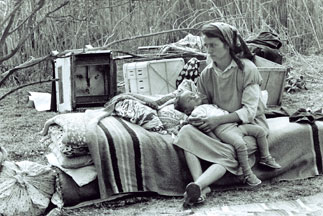 |
Left: Nearly one million Azerbaijanis
were made homeless in their own land because of the Nagorno-Karabakh
War with Armenia. Photo: Oleg Litvin, 1993.
Every society, every nation
has its own pace as it marches towards democracy. And in my view
that's what is happening in Azerbaijan now. I want to emphasize
that the trend is in the right direction. We are going the right
way towards democratization.
I'm glad that President Ilham Aliyev's visit to the United States
convinced Washington that he genuinely shares the same values
and aspirations for freedom and democracy and sees the future
of Azerbaijan, in his own words, "as a modern, secular,
democratic country." I'm also very pleased that President
Aliyev's successful visit was my "last accord" as an
Ambassador of Azerbaijan to the United States. By the way, this
final visit that I helped to organize was the eighth visit of
an Azerbaijani President to the United States during my tenure
in Washington.8
|
AI: You served as Ambassador
in the United States for 14 years. During that same period, there
have been six different U.S. ambassadors.9 assigned to Azerbaijan. You've also
served during three Presidential terms and two Presidents - Bill
Clinton and George W. Bush. That's an enormous difference in
terms of years in a position to understand the complexity of
that particular society.
Yes, you're right. Azerbaijan's
situation was unusual. We didn't have any experience in foreign
policy when I first became Ambassador. We had no well-established
diplomatic training. Actually, we had no embassies. For that
reason, we were obliged to use the individuals chosen to serve
as ambassadors as long as possible.
In my situation - as you may know - I requested President Heydar
Aliyev to release me after his official visit to Washington in
1997. But the President told me that we needed more time to educate
the American public, especially in regard to Section 907 and
that I should continue awhile as it would take time for a new
ambassador to learn the job. Well, that "little while"
turned into eight-nine more years.
The United States, of course, has an absolutely different situation.
The American government can draw upon many capable, well-trained
individuals to fill their positions of ambassadors. They have
some very well-established policies that determine how many years
each ambassador should spend in a particular country.
AI: What major differences
did you observe in the U.S. government's attitude toward Azerbaijan
during the different Presidential administrations?
Ambassador Pashayev: Well, Bill Clinton represented the Democrats;
and George Bush, the Republicans. In terms of relations and policy
towards Azerbaijan, I can't say that I observed any major difference.
As you know, President Clinton did a great job in supporting
the energy policy of Azerbaijan. As a result, we were successful
in signing what we call "The Contract of Century" for
the development of the giant oil field Azeri, Chirag and Gunashli
(ACG) and in putting forward the global project of Baku-Tbilisi-Ceyhan
(BTC) pipeline route.
President Bush did much less than Clinton in terms of oil. It's
easy to explain because in 2001 after the 9/11 (September 11th)
attack on the World Trade Center in New York, he focused on organizing
a coalition against terrorism. So, terrorism became the major
issue in relations between US and Azerbaijan. For both administrations,
I have no complaints in terms of their attitude towards Azerbaijan.
Both administrations opposed Section 907. Their position was
very clear. They opposed these sanctions. It was Congress who
had put them in place and maintained them.
 |
 |
Far Left:
Azerbaijan
International devoted two entire issues to the refugee problem:
Spring 1994 (Winter
of Disbelief),
and Left:
Spring 1997
(Refugees
Revisited).
Many articles about the refugee situation can be accessed on
our Web site. Search at AZER.com
AI: You've only been back
a few weeks in Azerbaijan [August 2006]. What do you sense are
the deepest concerns among the local population in relation to
the Middle East and the U.S.? After all, there are so many major
crises: Palestine, Afghanistan, Iraq, and now Lebanon. Azerbaijan
is geographically located rather close to each of those countries.
Being a Muslim country - though quite secular in nature - but
nevertheless, Muslim, what do you sense are the feelings among
general population towards these volatile situations?
|
Ambassador Pashayev: The U.S. has put itself in a very difficult
position, especially in relationship with the war in Iraq. No
one knows what might happen next, but let me respond by saying
that in 1975 when I first visited the U.S., it was very clear
to me that the spread of American ideals attracted everyone.
I remember the old Soviet days. It was these American ideals
of justice and human rights that made us so keen to listen to
radio broadcasts such as Voice of America and BBC. Keep in mind
that it wasn't so easy to gain access to such information.
But now since the collapse of the Soviet Union, the U.S. remains
the only Super Power of the world. And somehow, I don't know
how it happened, but they started to rely entirely on military
might, rather than diplomatic power.
These days there is often talk about the U.S. trying to conduct
war simultaneously on two or three fronts in different parts
of the world. Of course, maybe they can achieve this from military
capability (instead of strategic) point of view, but they are
losing the good will and trust of nations worldwide. I think
it's much more effective to persuade people of ideas diplomatically
than militarily. In my view, Americans are at risk of losing
some of their ideals and basic principles of democracy by going
down such a path. Their losing what attracted the world to them
- "the American dream," "the American way of life,"
"the America that we used to know". Especially now.
AI: So, in Azerbaijan do
you sense negative feelings towards the U.S.?
Ambassador Pashayev: I wouldn't call it "negative",
but there is immense "disappointment". But, of course,
our government and the majority of people here understand that
Azerbaijan and the U.S. should work together. The role of diplomats
is to facilitate and help people become aware of the importance
of our relationships.
AI: More and more lately, we hear that the U.S. is making
plans to attack Iran, claiming that if Iran gets access to nuclear
weapons they will be a threat to the region. In your opinion,
if the U.S. does attack Azerbaijan's neighbor to the south, how
will this affect Azerbaijan?
Ambassador Pashayev: First of all, let me emphatically say
that the idea of the U.S. attacking Iran is not a good idea at
all. The disputes and difficulties that exist between the U.S.
and Iran must be resolved by peaceful diplomatic means. All difficult
issues must be resolved peacefully.
If the U.S. were to attack Iran, of course, there would be enormous
implications for Azerbaijan. Very negative implications and I
would not advise such action. If officials in the U.S. were to
ask our advice, categorically, we would advise against any such
attack. It's not a good idea, and there would be very serious
and negative repercussions for Azerbaijan.
As you know, Azerbaijan already has so many refugees. Nearly
one million people in our small country of eight million people
have been displaced because of the Armenian war over Nagorno-Karabakh.
We don't want to revisit those tragic days. We had enormous problems
trying to house and feed so many hundreds of thousands of people
on limited resources. To this day, we bear the scars of that
calamity.
Should there be an attack against Iran, no doubt there will be
a flood of Iranians coming across our borders to seek refuge.
This would be humanitarian disaster for Azerbaijan.
Openness and dialog is the way to bring opponents and adversaries
to your side. Through communication. Through discourse. Those
are much more effective ways than to attempt to use military
might. Earlier, I mentioned about the image of U.S. in the world.
Any new attack will create enormous complications and difficulties
even for the U.S. itself. It's absolutely not the correct path
to go in order to achieve stability in the region.
AI: Now that you're back
in Baku, what are your plans for the future? Are you retiring?
Ambassador Pashayev: Actually, after so many years in Washington,
I think I deserve to get out of any business related to the government
so that I can have some free time to enjoy life. And that's exactly
what I was gearing up to do when I returned to Baku this summer.
I've had enough. I was yearning to have a chance to live a private
life with my family.
I'm grateful to three successive presidents of Azerbaijan - Abulfaz
Elchibey (1992-93), Heydar Aliyev (1993-2003) and Ilham Aliyev
(2003-) - who trusted and honored me with the opportunity to
represent my country in the world's sole remaining power center
at such a crucial time in our history. It has been a privilege
to serve in this capacity. To be honest, admittedly, it is a
bit sad to be leaving such a major part of my life behind. But
the time is ripe to move on and clear the playing field for others
who, undoubtedly, will continue in what hopefully has been my
humble contribution to the thriving alliance between our two
nations.
But then the idea has begun to take shape that we should take
advantage of those many years in Washington and utilize my experience
to do something useful by helping to create a Diplomatic Academy
in the Foreign Ministry. President Ilham Aliyev supported the
idea and I have been asked to lead this process. Though this
idea was something new that I had to think about, I realized
how important it would be for Azerbaijan and for diplomacy, not
only for international relations actually, but for all Azerbaijani
government structures to have a school which would help to provide
concrete knowledge of the modern world in a modern education
system.
And so now, I have committed myself to this goal. My plan is
to create something not only for Azerbaijan but a school that
could be used to train diplomats in the region and, perhaps,
even beyond. I am currently working with friends in the U.S.
from various universities to come up with some ideas of how to
structure such an institute.
We're in the process now. Of
course, I want to build something new for Azerbaijan a
new university campus. I think it's very important to establish
a diplomatic college based upon international standards. And
I see it being developing in various stages.
Of course, intitially, we would
like to organize executive programs for our diplomats in the
Foreign Ministry and other ministries of the Azerbaijani government,
for those who need international training.
I visualize the second stage
being the development of a graduate school, with a Master's degree
program. The third stage would be to create a full-scale university-type
institution, offering a Master's degree in International Relations.
My greatest dream now is for this Diplomatic College to become
a center of excellence.
Life is education in every sense.
So, of course, we must share our experience with the young generation
and I think the best way to share our diplomatic experience will
be through this Academy.
_____
Footnotes
1
The White House deemed
that the "Freedom Support Act" was a "once-in-a-century-opportunity"
to help freedom take root and nourish in the lands of Russia
and Eurasia whose success in democracy and open markets would
directly enhace our own national security. The growth of freedom
there would create business and investment opportunities for
Americans and multiply the opportunities for friendship between
our peoples." See the Press Release Fact Sheet announcing
the passage of the Freedom Support Act passed on October 24,
1992. Visit: Federation fo American Scientists at http://fas.org/spp/starwars/offdocs/b920401.htm.
2 The 15
former republics of the Soviet Union: Armenia, Azerbaijan, Belarus,
Estonia, Georgia, Kazakhstan, Kyrgyzstan, Latvia, Lithuania,
Moldova, Russia, Tajikistan, Turkmenistan, Ukraine and Uzbekistan.
Of these, only the government of Azerbaijan was denied U.S. assistance
during this critical period of transition from a centralized
government to a market economy.
3 For a
discussion about the content of these UN Resolutions 822, 853,
874 and 884, see "The Nagorno-Karabakh Question: UN Reaffirms
the Sovereignity and Territorial Integrity of Azerbaijan"
By Yashar T.Aliyev [UN Representative at the time], AI 6.4 (Winter
1998). Search AZER.com.
4
In 2003, Azerbaijan
sent 160 troops to Iraq as part of what President Bush called
"The Coalition of the Willing".
5 Monica
Lewinsky: A young woman with whom President Bill Clinton had
a sexual relationship in the White House for four months betweeen
1995-1996. The scandal that broke out resulted in Congress trying
to impeach him but in the end he acquitted and remained in office.
Clinton remained popular with the public throughout his two terms
as President, ending his presidential career with a 65 percent
approval rating, the highest end-of-term approval rating of any
President since Eisenhower. Source: Wikipedia: Oct 10, 2006.
6 "Color
Revolution": Refers to the general non-violent change of
government via elections and alleged people movements that recently
occured in a few of the former Republcs of the Soviet Union.
These include the "Rose Revolution" in Georgia in 2003
that ended the Presidency of Eduard Shevardnadze, the "Orange
Revolution" in Ukraine, which ended with the election of
Viktor Yushchenko in 2004-2005, and Tulip Revolution in Kyrgyzstan,
which led to the overthrow of Askar Akayev in 2005.
7 Leonid
Ilyich Brezhnev (1906-1982) was the effective ruler of the Soviet
Union from 1964 to 1982, though at first in partnership with
others. He was General Secretary of the Communist Party of the
Sovet Union from 1964 to 1982, and was twice Chariman of the
Presidium of the Supreme Soviet (head of state), from 1960 to
1964 and from 1977 to 1982. Source: Wikipedia on October 10, 2006.
8 Eight
presidential visits: six with President Heydar Aliyev (whose
presidential term in office was 1993-2003) and two with his son
Ilham Aliyev(2003-).
9
U.S. Ambassadors appointed
to Azerbaijan: Richard Miles (1992-1993), Richard Kauzlarich
(1994-1997), Stanley Escudero (1997-2000), Ross Wilson (2000-2003),
Reno Harnish (2003-2006), and Anne Derse (July 2006-).
_____
Back to
Index
AI 14.3 (Autumn
2006)
AI Home
| Search | Magazine
Choice
| Topics
| AI Store | Contact us
Other Web sites
created by Azerbaijan International
AZgallery.org | AZERI.org | HAJIBEYOV.com
|














